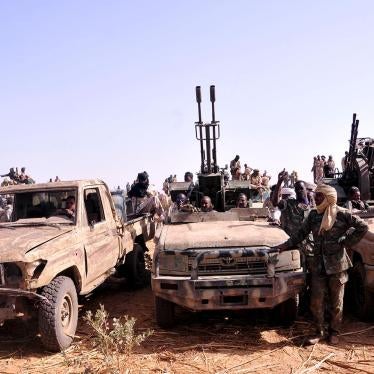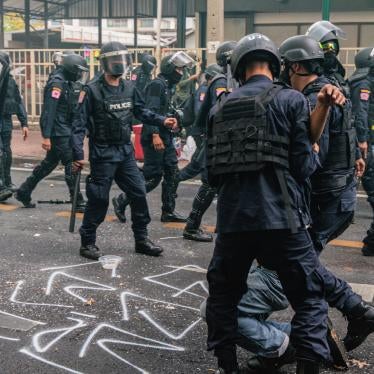First Lady Laura Bush
The White House
1600 Pennsylvania Avenue
Washington, D.C. 20500
Dear Mrs. Bush:
As you prepare to travel to Europe to highlight the role of the United States in rebuilding Afghanistan, you are in a unique position to increase support for Afghan women's human rights. We write to bring to your attention serious security concerns that Afghan women are presently facing. Attacks and threats to their physical safety are denying women the opportunity to exercise their basic human rights and to participate fully in the rebuilding of their country. As you know, the overthrow of the Taliban in November 2001 has led to greater freedom for women and girls in Afghanistan to participate in public life and to have access to education, health care, and employment. However, the continuing threat to security that women face in northern Afghanistan, and other areas of generalized insecurity, has in large measure rendered women's participation in public life almost impossible.
Human Rights Watch has researched and reported extensively on Afghanistan, with recent research undertaken in February and March 2002. According to our research, the danger of physical assault is evident throughout northern Afghanistan, where ethnic Pashtuns have been specifically targeted for violence and harassment, including sexual violence. Human Rights Watch documented cases of sexual violence against Pashtun women perpetrated by the three main ethnically based parties and their militias in the north. Although Pashtun women in the north have been specifically targeted for sexual violence, Human Rights Watch researchers also gathered credible evidence of continuing politically or ethnically motivated sexual violence against women and girls of other ethnicities in Mazar-i Sharif, in northern Afghanistan.
This violence and insecurity has serious consequences for women in terms of their participation in the rebuilding of Afghanistan during this critical period. Afghan women in Mazar reported that they live under constant fears of physical assault and feel compelled to limit their movement, expression, and dress to avoid becoming targets of such violence by armed civilians or armed factions. Even in Kabul, where the presence of the 4,500 strong International Security Assistance Force has provided better security conditions than in the rest of the country, women are still hesitant about participating in public life. Human Rights Watch researchers were told of a number of incidents of harassment faced by women by armed factions and by those seeking to enforce repressive religious edicts.
We are also concerned that women's representation and participation in the future government of Afghanistan could be undermined. On April 15, Afghanistan began the process of choosing its next government to replace the Interim Administration. One hundred and sixty women representatives are guaranteed seats in this process and others may be elected to non-reserved seats. However, women face considerable challenges in this process, which include entrenched traditional attitudes in Afghanistan constraining women from participating in political processes, as well as security concerns inhibiting women from traveling to regional centers to cast ballots.
In your radio address of November 17, 2001, you stated, "our dedication to respecting and protecting women's rights in all countries must continue if we are to achieve a peaceful, prosperous, and stable world." We agree with this assessment and believe that a long-term engagement with Afghanistan by the international community, including the United States, is critical to ensure stability and sustainable reconstruction. In particular, we believe that the following recommendations are valuable first steps to enable Afghan women to participate in the reconstruction of their county.
- Support security arrangements for areas outside of Kabul and efforts to disarm commanders and forces that are implicated in war crimes or serious human rights violations.
- Encourage funding for human rights monitoring in Afghanistan, and specifically provide direct financial and programmatic assistance to the Afghan Ministry for Women's Affairs.
- Call on the Interim Administration to undertake public education campaigns to communicate its commitment to women's equality in all realms of Afghan society, including informing women about the appropriate government agencies to investigate instances of violence and discrimination against women.
Thank you for your attention to these matters.
Sincerely,
LaShawn R. Jefferson
Executive Director
Women's Rights Division





